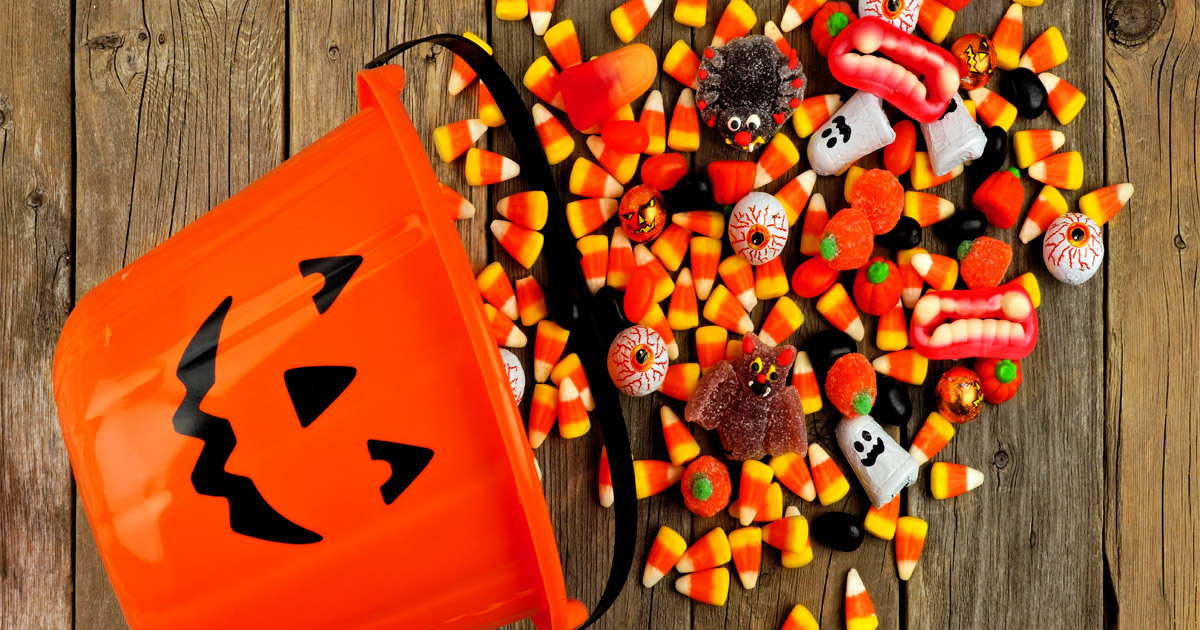It is almost impossible to avoid candy and other sweets during October and Halloween. In fact, the top five candy selling days are all in October.
You have probably been told that sugar is bad for your teeth, but that is not entirely the case. Tooth damage occurs due to the plaque bacteria that feed on sugar in the mouth and saliva. While there are both good and bad bacteria in the mouth, the harmful bacteria create certain acids that damage tooth enamel when it eats sugar, leading to cavities.
A cavity typically starts as a small hole but can enlarge quickly, especially without medical intervention. Untreated cavities lead to other oral problems, such as gum and bone loss and extensive tooth decay, which can result in the need to extract the tooth or place dental implants.
What Types of Halloween Candy Are the Worst for Your Teeth?
Some types of Halloween candy are worse for your teeth than others. Candy that is the most damaging to your teeth include:
- Sticky and chewy: Candies that are sticky, chewy, and gummy increase the risk of tooth decay due to the consistency of the sugars. Treats such as caramels, taffy, and gummies stick to the teeth more and are not easily washed away by the saliva in your mouth.
- Sour candies: Sour candies pack a double punch. The are highly acidic, and combined with the sugar, break down tooth enamel in multiple ways.
- Hard candies: Hard candy can affect your teeth for multiple reasons. They stay in your mouth longer than other candies and rest against your teeth and gums longer, produce more saliva that washes over all teeth, and can even break teeth if chewed.
How Can You Lower Your Risk of Damage When Eating Halloween Candy?
Despite the damage sugar can cause, you can still enjoy your Halloween treats if you minimize the damage by:
- Consuming more water: You can minimize the effects sugar has on your teeth by drinking more water while eating the candy, especially if you are not able to brush your teeth immediately after you have eaten. Rinsing out your mouth with water also helps flush out the amount of sugar remaining in your mouth and on your teeth.
- Eating candy with meals: Your mouth produces more saliva when you eat, particularly during meals. Consuming your candy after a meal can help reduce the effects of sugar on your teeth.
- Brushing your teeth: After eating Halloween candy, brush your teeth to remove sugar and bacteria that can damage enamel. Wait 30 minutes to brush if you have consumed sour and acidic candies or drinks, as the acid temporarily weakens the enamel.
- Flossing your teeth: Sugar and candy can lodge between your teeth, particularly chewy and sticky candy. Flossing when you brush your teeth after eating candy can help dislodge tiny pieces that may remain.
Halloween also presents parents with an opportunity to establish or reinforce overall good oral habits throughout the year, such as:
- Not allowing children to enjoy a few pieces of candy after trick-or-treating. Doing so often results in children wanting the candy even more and cause them to start a very bad habit of sneaking treats or eating too many.
- Sorting through the candy with children, and encouraging them to make better choices and avoid sticky, chewy, sour, or hard candies.
- Storing candy out of reach, and establishing a set time of the day when children are allowed to eat their candy.
- Creating a brushing schedule if you do not already have one, and including an additional brushing time immediately after your children eat candy.
South Jersey Oral Surgeons at Lanzi Burke Oral & Maxillofacial Surgeons Repair Damage Caused by Sugary Treats
Good oral health plays a significant role in your overall health. If you have an oral problem that needs surgery, speak with one of our South Jersey oral surgeons at Lanzi Burke Oral & Maxillofacial Surgeons. We treat a wide variety of oral health problems. Call us at 856-582-4222 or contact us online. Located in Washington Township, Haddonfield, and Woolwich Township, New Jersey, we are dedicated to helping patients throughout South Jersey.


